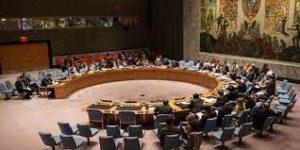What Is The UNSC 1267 Committee?

China placed a “hold” on two joint India-US proposals, to designate Lashkar-e-Taiba (LeT) top leaders at the United Nations Security Council’s (UNSC) 1267 list of terrorists affiliated to Al Qaeda and ISIS.
UNSC 1267 Committee:
- It was first set up in 1999 (updated in 2011 and 2015), and strengthened after the September, 2001 attacks.
- It is now known as the Da’esh and Al Qaeda Sanctions Committee.
- It comprises all permanent and non-permanent members of the United Nations Security Council (UNSC).
- The 1267 list of terrorists is a global list, with a UNSC stamp. It is full of Pakistani nationals and residents.
- It is one of the most important and active UN subsidiary bodies working on efforts to combat terrorism, particularly in relation to Al Qaeda and the Islamic State group.
- It discusses UN efforts to limit the movement of terrorists, especially those related to travel bans, the freezing of assets and arms embargoes for terrorism.
- Any member state can submit a proposal for listing an individual, group, or entity.
- The proposal must include acts or activities indicating the proposed individual/group/entity had participated “in the financing, planning, facilitating, preparing, or perpetrating of acts or activities” linked to “ISIL (Da’esh), Al-Qaida or any cell, affiliate, splinter group or derivative thereof”.
- Decisions on listing and de-listing are adopted by consensus.
- The proposal is sent to all the members, and if no member objects within five working days, the proposal is adopted.
- An “objection” means curtains for the proposal.
- Any member of the Committee may also put a “technical hold” on the proposal and ask for more information from the proposing member state. During this time, other members may also place their own holds.
- The matter remains on the “pending” list of the Committee until such time as the member state that has placed the hold decides to turn its decision into an “objection”, or until all those who have placed holds remove them within a timeframe laid down by the Committee.
- Pending issues must be resolved in six months, but the member state that has placed the hold may ask for an additional three months.




